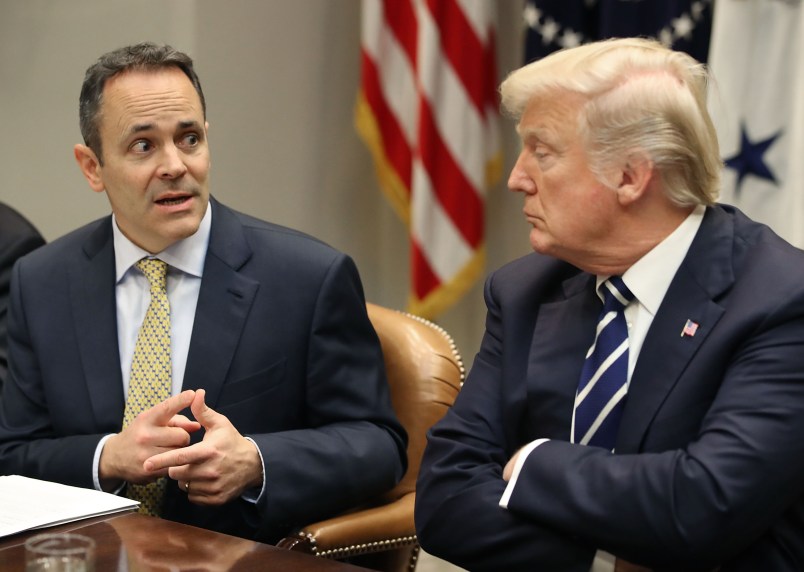The first legal challenge to the Trump administration’s crusade for Medicaid work requirements came before a federal judge in Washington on Friday, where attorneys representing 16 low-income Kentuckians argued they would be unlawfully stripped of Medicaid coverage should the court allow the state’s waiver to take effect in July. The groups challenging the policy said the work requirements violate Congress’ original intent for the Medicaid program and instead are a mere cover for cutting tens of thousands of people from the rolls.
In response, attorneys representing the Trump administration and Kentucky Gov. Matt Bevin (R) warned U.S. District Judge James Boasberg of dire consequences should he rule against their new Medicaid rules.
Matthew Kuhn, arguing on behalf of Kentucky, pointed to Bevin’s executive order to terminate the state’s Medicaid expansion entirely, stripping health coverage from more than 400,000 people, if the court strikes down any piece of the waiver.
Kuhn claimed that “serious budget problems” mean that “the governor will be forced to withdraw from expanded Medicaid” if he’s not allowed to impose the rules, which are expected to save the state money by kicking at least 95,000 people off of Medicaid. “We are making sure Medicaid remains sustainable,” he said.
Boasberg appeared skeptical of this line of argument, noting that under the Affordable Care Act, the federal government currently reimburses states for about 95 percent of the cost of the Medicaid expansion if they opt into the program.
“Why are you attacking the expansion population, when the rate of reimbursement is much higher there than in traditional Medicaid?” he asked.
“We consider traditional Medicaid sacred,” Davis replied. He added that the lawsuit should be thrown out entirely because of the state’s threat to un-expand, saying that it made the plaintiff’s claim of imminent injury not “redressable” since they will lose their Medicaid coverage no matter how the court comes down.
“Even if the waiver is an absolute barrier for them, there’s another absolute barrier right after,” he said.
Attorney Ethan Davis, arguing on behalf of the Trump administration, went even further, warning Boasberg that a ruling against Kentucky would deter other states around the country who are weighing whether or not to expand. The judge did not engage with this line of argument.
Ian Gershengorn, the lead attorney representing the plaintiffs, told TPM after the hearing that he doesn’t suspect these threats will be effective in convincing the court to rule in the government’s favor, calling them “not legally relevant” and “dubious as a policy matter.”
While the Trump administration’s favorable view on work requirements and other Medicaid restrictions has made Medicaid expansion more palatable to Republican-controlled states, ballot initiative efforts are moving forward in red and blue states to expand Medicaid with or without a strict waiver.
“The premise that there’s this big wave of states waiting for the outcome of this case to decide on expansion — that makes a good dorm room philosophical discussion but it’s just not borne out by the facts,” Elliot Fishman, who led CMS’ work on Medicaid waivers under the Obama administration and now works for the health advocacy group Families USA, told TPM after the court hearing. “That’s just not a reality.”
Fishman added that even Bevin’s pledge to terminate Kentucky’s Medicaid expansion if he doesn’t get his way in court — a much more real threat backed up by an executive order — should not factor to Boasberg’s decision.
“I find it so abhorrent that [Bevin is] threatening coverage for his own people in order to strong-arm the court,” he told TPM. “I certainly would not, if I were this judge, allow that threat to color a ruling on this.”
Aside from government’s repeated warnings about the potential harm caused by striking down the waiver, much of Friday’s 90 minutes of oral arguments centered on determining the purpose of Medicaid as originally laid out by Congress.
“Providing access to medical assistance is not the same as improving people’s health,” Boasberg noted, describing a scenario of two healthy people, one of whom obtained insurance easily and the other broke because she lacks insurance and is struggling to pay her medical bills, which, in turn, causes other adverse effects in her life.
Gershengorn enthusiastically agreed with this interpretation, warning Boasberg that if the purpose of Medicaid is determined to be a vague goal of improving health, “that would mean anything goes — forced eating regimens, forced exercise — anything that the Secretary claims will make people healthier is permissible.”
During the oral arguments, the Judge also wrestled with the question of how much deference the administration should get in setting policy. When Davis argued on behalf of the Trump administration that these Medicaid waiver decisions should not be reviewable by courts at all, he balked.
“What if they issued a waiver to no longer cover blind people?” he asked. “Would you really be here in front of me saying, ‘We can do what we want?'”
Davis replied that the administration is legally obligated to follow the laws set by Congress — which would bar excluding blind people from Medicaid — whether or not their actions are “judicially reviewable.”
With Kentucky’s July implementation for the rules looming, Boasberg told the courtroom he would do his best to issue a ruling by the end of June.







Matthew Kuhn, arguing on behalf of Kentucky, pointed to Bevin’s executive order to terminate the state’s Medicaid expansion entirely, stripping health coverage from more than 400,000 people, if the court strikes down any piece of the waiver.
And the people of Kentucky pointed to the rope they threw over a large oak tree limb on the Capitol grounds and said
“Please Proceed”
Republicans: Allowing people to suffer and die is saving them from the misery government assistance.
Talk about war on the poor, eh hoser?
not like the tax cuts for the 1% are going to pay for themselves, amiright?
So now the Rs are going to start threatening judges who the fuck elects these idiots?